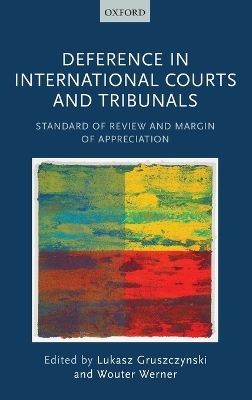
Deference in International Courts and Tribunals
Standard of Review and Margin of Appreciation
Seiten
2014
Oxford University Press (Verlag)
978-0-19-871694-5 (ISBN)
Oxford University Press (Verlag)
978-0-19-871694-5 (ISBN)
International courts use two key methodologies to determine the degree of deference granted to states in their implementation of international obligations: the standard of review and margin of appreciation. This book investigates how these doctrines are applied in international courts, analysing where their approaches converge and diverge.
International courts and tribunals are often asked to review decisions originally made by domestic decision-makers. This can often be a source of tension, as the international courts and tribunals need to judge how far to defer to the original decisions of the national bodies. As international courts and tribunals have proliferated, different courts have applied differing levels of deference to those originial decisions, which can lead to a fragmentation in international law. International courts in such positions rely on two key doctrines: the standard of review and the margin of appreciation. The standard of review establishes the extent to which national decisions relating to factual, legal, or political issues arising in the case are re-examined in the international court. The margin of appreciation is the extent to which national legislative, executive, and judicial decision-makers are allowed to reflect diversity in their interpretation of human rights obligations.
The book begins by providing an overview of the margin of appreciation and standard of review, recognising that while the margin of appreciation explicitly acknowledges the existence of such deference, the standard of review does not: it is rather a procedural mechanism. It looks in-depth at how the public policy exception has been assessed by the European Court of Justice and the WTO dispute settlement bodies. It examines how the European Court of Human Rights has taken an evidence-based approach towards the margin of appreciation, as well as how it has addressed issues of hate speech. The Inter-American system is also investigated, and it is established how far deference is possible within that legal organisation. Finally, the book studies how a range of other international courts, such as the International Criminal Court, and the Law of the Sea Tribunal, have approached these two core doctrines.
International courts and tribunals are often asked to review decisions originally made by domestic decision-makers. This can often be a source of tension, as the international courts and tribunals need to judge how far to defer to the original decisions of the national bodies. As international courts and tribunals have proliferated, different courts have applied differing levels of deference to those originial decisions, which can lead to a fragmentation in international law. International courts in such positions rely on two key doctrines: the standard of review and the margin of appreciation. The standard of review establishes the extent to which national decisions relating to factual, legal, or political issues arising in the case are re-examined in the international court. The margin of appreciation is the extent to which national legislative, executive, and judicial decision-makers are allowed to reflect diversity in their interpretation of human rights obligations.
The book begins by providing an overview of the margin of appreciation and standard of review, recognising that while the margin of appreciation explicitly acknowledges the existence of such deference, the standard of review does not: it is rather a procedural mechanism. It looks in-depth at how the public policy exception has been assessed by the European Court of Justice and the WTO dispute settlement bodies. It examines how the European Court of Human Rights has taken an evidence-based approach towards the margin of appreciation, as well as how it has addressed issues of hate speech. The Inter-American system is also investigated, and it is established how far deference is possible within that legal organisation. Finally, the book studies how a range of other international courts, such as the International Criminal Court, and the Law of the Sea Tribunal, have approached these two core doctrines.
Lukasz Gruszczynski is Assistant Professor of International Law at the Institute of Law Studies of the Polish Academy of Sciences. He is the author of Regulating Health and Environmental Risks Under WTO Law (OUP, 2010). Wouter Werner is Professor of Public International Law at the Free University of Amsterdam. He is a member of the Dutch Advisory Council on Public International Law, and is an editor of the Leiden Journal of International Law and the Netherlands Yearbook of International Law.
PART I: GENERAL ISSUES/COMPARATIVE PERSPECTIVES; PART II: INTERNATIONAL INVESTMENT LAW AND WTO LAW; PART III: EUROPEAN UNION LAW; PART IV: INTERNATIONAL HUMAN RIGHTS LAW; PART V: OTHER INTERNATIONAL COURTS
| Erscheint lt. Verlag | 9.10.2014 |
|---|---|
| Verlagsort | Oxford |
| Sprache | englisch |
| Maße | 162 x 240 mm |
| Gewicht | 836 g |
| Themenwelt | Recht / Steuern ► EU / Internationales Recht |
| Recht / Steuern ► Öffentliches Recht ► Völkerrecht | |
| Sozialwissenschaften ► Politik / Verwaltung ► Europäische / Internationale Politik | |
| ISBN-10 | 0-19-871694-X / 019871694X |
| ISBN-13 | 978-0-19-871694-5 / 9780198716945 |
| Zustand | Neuware |
| Informationen gemäß Produktsicherheitsverordnung (GPSR) | |
| Haben Sie eine Frage zum Produkt? |
Mehr entdecken
aus dem Bereich
aus dem Bereich


